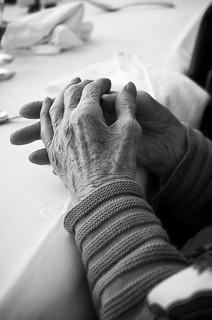Justice always requires someone willing to seek it. In many cases, the first step towards justice is a witness or victim speaking up and reporting a wrong. All too often, as our Oakland elder abuse law firm knows from first-hand accounts, witnesses and victims are afraid to speak. Even the most well-meaning and good-hearted people can be worried about retribution or be paralyzed by doubt about their role and whether it is their place to speak up. The law can help by clarifying responsibilities. A new provision in California law on mandatory reporting of elder abuse seeks to do just this, making it clear that certain witnesses have an obligation to speak up when they see a wrong and allowing the law to guide them when they might doubt the proper response.
Obligation to Report Elder Abuse Expanded for Care Center Staff
 As reported recently in The Napa Valley Register, a new law took effect on January 1st that aims to help combat the problem of caregivers abusing, neglecting, or stealing from seniors by expanding mandatory reporting requirements. Assembly Bill 40 doubles prior reporting duties for those required by California law to report witnessing abuse of long-term care center residents. The mandatory reporters covered by the provision are employees, supervisors, and administrators at such facilities. Such individuals no longer have the option of choosing between reporting alleged crimes to either the center’s ombudsman or law enforcement; they now must notify both. This duty includes contacting local law enforcement by both phone and written report within two hours of a suspected incident involving an injury or within twenty-four hours when no injury occurs. Failure to comply with this duty to report abuse is classified as a misdemeanor and carries a maximum penalty a $1,000 fine and/or six months jail sentence.
As reported recently in The Napa Valley Register, a new law took effect on January 1st that aims to help combat the problem of caregivers abusing, neglecting, or stealing from seniors by expanding mandatory reporting requirements. Assembly Bill 40 doubles prior reporting duties for those required by California law to report witnessing abuse of long-term care center residents. The mandatory reporters covered by the provision are employees, supervisors, and administrators at such facilities. Such individuals no longer have the option of choosing between reporting alleged crimes to either the center’s ombudsman or law enforcement; they now must notify both. This duty includes contacting local law enforcement by both phone and written report within two hours of a suspected incident involving an injury or within twenty-four hours when no injury occurs. Failure to comply with this duty to report abuse is classified as a misdemeanor and carries a maximum penalty a $1,000 fine and/or six months jail sentence.
Why Mandate Reporting?
Discussing the new measure, Napa County District Attorney Gary Lierberstein notes that SB40 is consistent with similar legislation for other crimes such as the mandatory reporting of suspected child abuse. Both prosecutors and advocates for seniors say they hope the law brings more crimes to light and ensures abuse is reported quickly. The bill was introduced last March by Assemblywoman Mariko Yamada of Davis in response to findings from the state Senate and Disability Rights California noting spotty and delayed reporting of abuse in the senior care environment.
Prior studies also noted that nursing home ombudsmen are torn between conflicting duties. The ombudsman program is run by the state Department of Aging and the county-level agents must work with care centers to improve living conditions while at the same time investigating violations by the same homes they are charged with working with on similar issues. Ombudsmen lack law enforcement privileges and federal law requires that they get a victim’s consent in order to report alleged abuse, theft, or neglect to police or other officials. A study conducted in 2009 found as many as 75% of patients refuse to consent or unable to effectively give consent due to dementia or other issues. According to one representative from the program, some seniors fear retaliation if they agree to report a problem and ombudsmen are bound by the patient’s decision (or, as noted, limited by the inability of a patient to consent). The expanded reporting rules of SB 40 seek to resolve this issue by expanding reporting requirements.
Working Together to Help the Victims of Elder Abuse
The Brod Law Firm is proud to serve as a law firm for California elder abuse victims and their loved ones. Our team supports efforts to crack down on this growing problem. We hope the new elder abuse law helps to improve reporting so that fewer seniors are forced to live with financial, emotional and/or physical abuse. We also encourage everyone, including those not covered by any mandatory reporting law, to speak up when witnessing abuse or mistreatment, especially where the victim may be unable or too afraid to report the abuse themselves. For help, visit the Department of Social Services or the Department of Consumer Affairs, both of which provide information on reporting elder abuse in California.
See Related Blog Posts:
A Website Aimed at Preventing Elder Abuse and Helping the Victims
A Joint Effort – Criminal and Civil Liability for Nursing Home Abuse
(Photo by Jonas Boni)
 San Francisco Injury Lawyer Blog
San Francisco Injury Lawyer Blog

